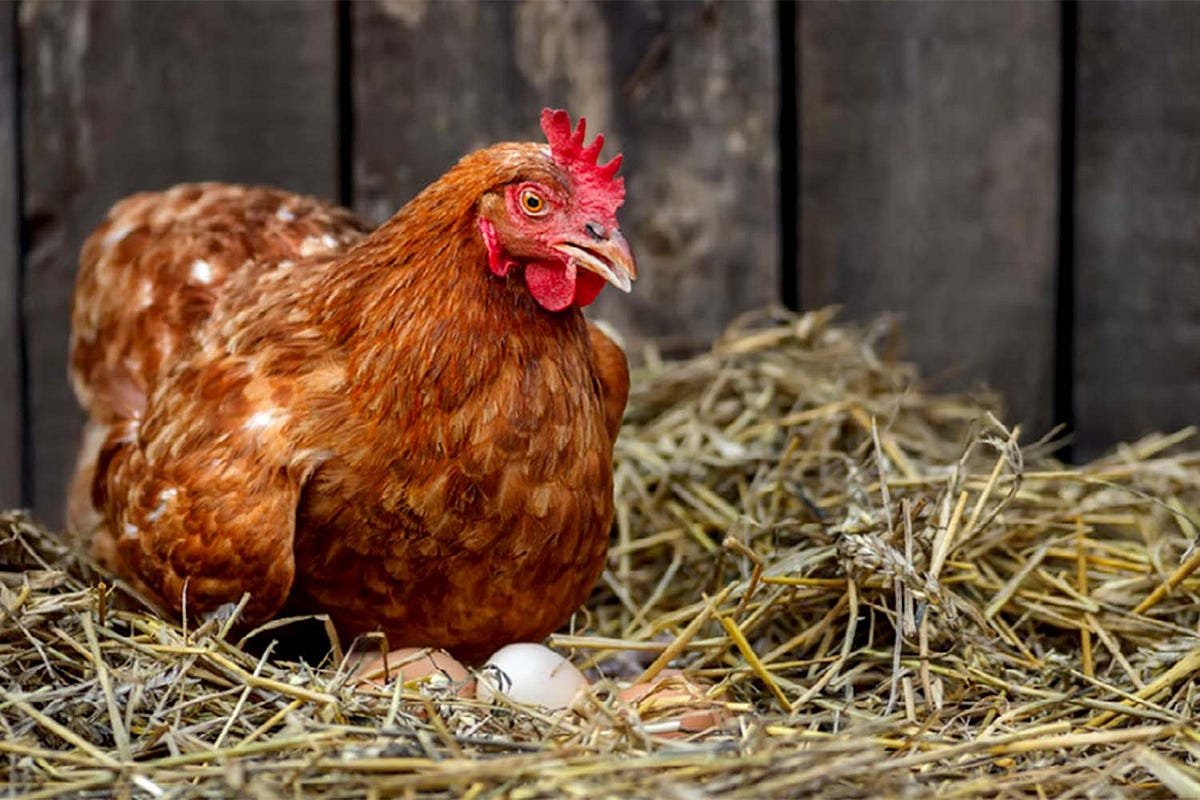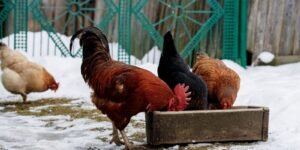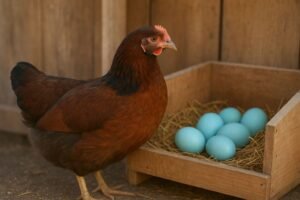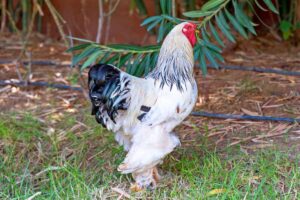Do I Need a Rooster to Get Eggs? Quick Answer: Nope, hens lay eggs all by themselves—no rooster needed.
TL;DR: Hens lay unfertilized eggs without a rooster. You only need a rooster if you want to hatch chicks. Roosters offer protection and flock harmony but can be noisy and aggressive. Consider local laws, neighbors, space, and your goals before getting one.
Who This Is For: Thinking about raising backyard hens? Wondering if a rooster is a must-have? Here’s the no-fluff answer!
No, you absolutely do not need a rooster to get eggs from your hens. Hens lay eggs naturally without a rooster. A rooster is only needed if you want fertilized eggs to hatch chicks. Otherwise, your hens will still produce delicious, unfertilized eggs daily—no rooster required. This is a common question, and honestly, I was right there with you when I started my flock. With egg prices soaring, backyard flocks are on the rise nationwide. Just like in San Antonio, where many embrace the trend, a grandma there keeps two hens and a rooster for fresh eggs and to honor tradition.
A hen’s ability to lay an egg is a natural biological process, like human ovulation. It happens whether a male is present or not. If you just want fresh eggs for eating, a rooster is optional—and sometimes complicated.
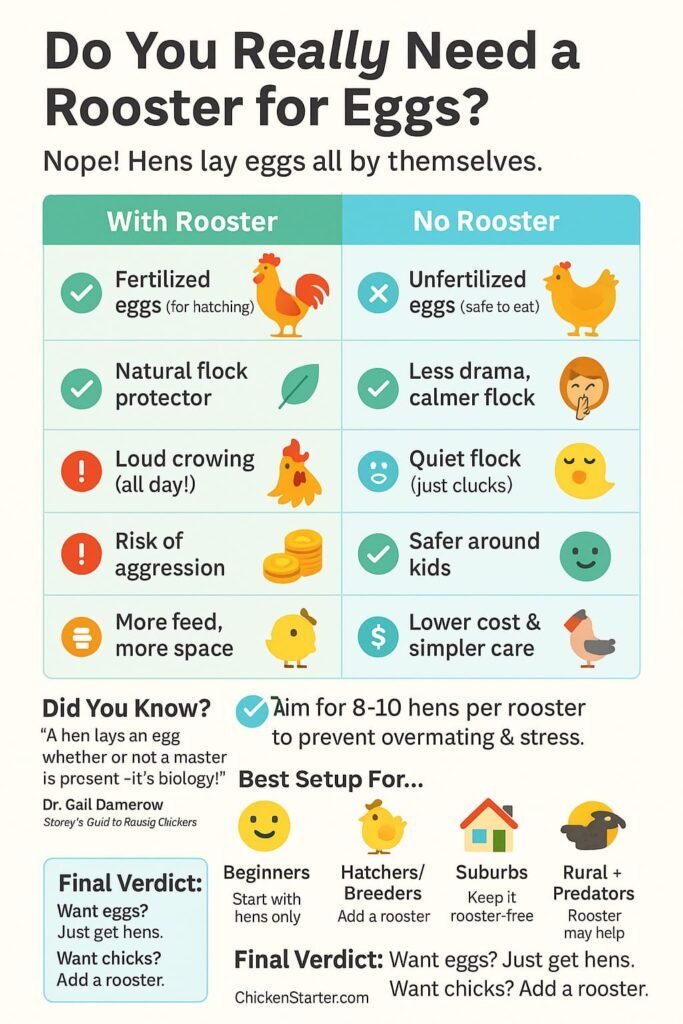
Understanding the Basics of Egg Laying
Many people wonder, “How do hens lay eggs on their own?” A hen’s ovary develops yolks. Once mature, a yolk travels down the oviduct. Along the way, egg white (albumen), membranes, and the shell form. This takes about 24-26 hours. Many people also ask, “Do chickens lay eggs naturally?” and the answer is a definitive yes, as this internal process shows.
Quick Egg Stats:
- Most hens begin laying around 18–22 weeks.
- Busy layers can produce 250–300 eggs in year one.
Here’s a breakdown of the fascinating journey an egg takes inside a hen, stage by stage:
| Stage | Organ Involved | What Happens | Time Elapsed (Approx.) |
|---|---|---|---|
| 1 | Ovary | Yolk formation and release. This is where the “heart” of the egg is created. | – |
| 2 | Magnum | Layers of thick egg white (albumen) are added around the yolk. | 3 hours |
| 3 | Isthmus | Two shell membranes form around the albumen, providing initial structure. | 1.25 hours |
| 4 | Uterus (Shell Gland) | The hard, protective outer shell is formed, and any pigments (for color) are applied. This is the longest stage. | 20 hours |
| 5 | Vagina/Cloaca | The fully formed egg is expelled from the hen. | Minutes |
It’s all an internal, hen-driven process. No male needed for this production line. Pretty neat, right?
Why Roosters Aren’t Necessary for Egg Production
Confusion often comes from misunderstanding fertilization. Hens lay eggs regardless of fertilization. Most commercial egg farms don’t keep roosters; their focus is unfertilized eggs.
This clearly demonstrates that hens laying eggs without a rooster is the norm. According to the USDA and American Egg Board, nearly all commercially sold eggs are unfertilized. As one Reddit user put it, “No need for a rooster! Hens will lay without one…” The question “Can chickens lay eggs without mating?” is a common one, answered with a clear yes.
An unfertilized egg is a hen’s unfertilized ovum. It’s like a human woman’s monthly cycle—the egg is released regardless of fertilization. These eggs are perfectly safe and delicious. So, relax—your hens aren’t waiting for a date to make breakfast happen! As Dr. Gail Damerow, a well-respected poultry expert and author of Storey’s Guide to Raising Chickens, often emphasizes, “A hen produces an egg whether a rooster is present or not. Fertilization simply determines if that egg could become a chick.” This foundational biological truth is key.
The Difference Between Fertilized and Unfertilized Eggs
Visually, telling the difference is hard without cracking them open.
- Unfertilized Eggs: A tiny, pinprick-sized white spot on the yolk (germinal disc). These are cells that could have developed if fertilized.
- Fertilized Eggs: The germinal disc looks like a small, donut-shaped target or bullseye, slightly larger. This blastoderm indicates cell division has begun. If incubated, it would develop into a chick.
Both types are nutritious and taste identical. You won’t find a partially developed embryo in your breakfast egg unless it was incubated and intended to hatch. Phew!
Dispelling Common Myths About Chickens and Roosters
Let’s bust a couple of persistent myths:
- Myth 1: “Eggs won’t be fresh without a rooster.” Untrue. Freshness depends on how recently it was laid and storage, not a rooster’s presence. Unfertilized eggs actually keep slightly longer because no embryo is developing. Don’t let anyone tell you your rooster-free eggs aren’t “farm fresh”! It’s fascinating how this myth persists, perhaps from earlier, less understood mixed flocks.
- Myth 2: “Hens are sad or lonely without a rooster.” Hens are social, but their well-being comes from other hens, space, food, and safety—not necessarily a rooster. Many hen-only flocks thrive, are productive, and content. Believe me, your girls are perfectly happy gossiping amongst themselves! While some argue a rooster adds a “natural” element, a well-managed all-hen flock rarely shows distress from his absence. As Sarah, a fellow backyard chicken owner from Ohio, once told me, “My flock of five hens is the most peaceful group. We get a dozen eggs every few days, and honestly, the quiet mornings are pure bliss without a crowing rooster!”
Benefits of Having a Rooster (Even if You Don’t Need Eggs)
Roosters offer unique advantages to a mixed flock, though these vary by individual personality and breed.
Rooster’s Role in Flock Protection
A rooster guards the flock, watching for predators like hawks or raccoons.
- Warning Calls: A rooster alarms hens, signaling them to take cover. My rooster, Rusty, frantically crowed, herding hens under the coop when a hawk’s shadow passed. They scurried to safety, thanks to his vigilance. He’s like a feathered, super-alert bodyguard!
- Physical Defense: Some brave roosters confront predators. While not always effective against larger threats (a bantam rooster versus a coyote isn’t a fair fight), their willingness to fight can buy hens time. Respect that courage, but set realistic expectations for their defensive limits.
Roosters and Flock Harmony: Maintaining Order
Roosters help maintain the pecking order. They reduce squabbles and ensure hens access food, water, and nesting boxes.
- Pecking Order: They keep things orderly. Less hen drama? Yes, please!
- Mating Behavior: A good rooster gently “tread” hens for fertilization, keeping them naturally “busy.” Crucially, not all roosters are “good” here; some can be overly aggressive or obsessively mate, which can stress hens and lead to reduced egg production or even injuries. A calm rooster is paramount.
Breeding and Fertilized Eggs: When a Rooster is Essential
If you want to hatch chicks and grow your flock naturally, you absolutely need a rooster! A rooster is essential for fertilization, which allows egg incubation and chick development—something you can’t get from a hen-only flock.
- Hatching Chicks: For incubating or a broody hen, you need fertilized eggs. Watching tiny chicks emerge is magical!
- Genetic Diversity: A rooster allows you to breed your own chickens, preserving traits and ensuring flock genetic diversity.
Potential Downsides of Keeping a Rooster
Roosters aren’t for everyone. They come with unique challenges that potential owners must consider. These can be real head-scratchers.
Noise Concerns: The Crowing Reality
A rooster’s crow is loud, frequent, and not just at dawn! They crow all day to assert dominance, alert the flock, or just because.
- Frequency: Roosters crow dozens of times daily, starting well before sunrise. Your alarm clock might feel redundant.
- Neighbors: This is often the biggest hurdle. Suburban and rural areas have noise ordinances, and some neighbors just won’t appreciate constant crowing. What’s charming to one is incessant to another, right? Always check local regulations. “No-crow” collars can help, but effectiveness varies. Rooster noise has led to serious neighbor disputes, so don’t underestimate it!
Aggression and Safety Considerations
Not all roosters are aggressive, but many can be. Their protective instinct can extend to humans, especially if they see you as a threat.
- Spur Injuries: Roosters have sharp leg spurs used in fights, which can cause painful injuries to people and other birds. They’re basically built-in daggers.
- Child Safety: This is critical for families. An aggressive rooster is dangerous. Choosing a docile breed and handling them frequently from a young age helps, but temperament varies. Sometimes, you just get a grumpy one. Experienced keepers distinguish between a “protective” rooster and a “mean” one; the latter often needs rehoming for everyone’s safety.
Additional Costs and Space Requirements
Adding a rooster means more food and space. He’s not just a cute accessory!
- Feed: An added expense.
- Housing: Adequate coop space is crucial to prevent stress and aggression.
- Land: Multiple roosters (not for beginners, trust me!) or a large flock require substantial space to prevent conflict.
Which Chicken Setup Is Right for You? A Decision Guide
Choosing between a hen-only flock and a mixed flock with a rooster depends entirely on your goals, resources, and living situation. Here’s a quick guide to help you decide:
| Feature/Goal | Hen-Only Flock | Mixed Flock (with Rooster) |
|---|---|---|
| Primary Goal | Fresh, unfertilized eggs for consumption. | Hatching chicks; flock protection & harmony. |
| Egg Production | Consistent, unfertilized eggs. | Consistent, but eggs will be fertilized (for hatching). |
| Noise Level | Generally quiet (clucking, chattering). | Loud crowing throughout the day. |
| Aggression Risk | Very low (hens rarely aggressive to humans). | Potential for aggression towards humans or hens. |
| Space Needs | Moderate; based on hen count. | Moderate to high; needs space for rooster, plus hen ratio. |
| Predator Control | Rely on secure coop/run & other deterrents. | Rooster provides active vigilance & defense. |
| Flock Dynamics | Peaceful, stable pecking order among hens. | Rooster maintains order, can prevent hen squabbles. |
| Breeding Ability | None (no fertilized eggs). | Yes, essential for natural breeding and chick production. |
| Cost | Lower initial and ongoing costs. | Higher due to rooster upkeep & potential medical needs. |
| Ideal For | Urban/suburban areas, beginners, quiet homes. | Rural areas, experienced keepers, those wanting chicks. |
Frequently Asked Questions About Roosters and Eggs
Quick answers to common questions about roosters and egg laying.
Do Chickens Lay Eggs Every Day Without a Rooster?
Yes! Hens lay based on breed, age, health, and environment, not a rooster. Many productive breeds lay almost daily.
How Can I Tell if an Egg is Fertilized?
“Candle” the egg after a few days of incubation: hold it to a bright light in a dark room. If fertilized, you’ll see a tiny dark spot (embryo) and red veins. Without incubation, just crack it open to see the “bullseye” on the yolk.
What Happens if an Egg is Fertilized and You Don’t Hatch It?
If a fertilized egg isn’t incubated (kept warm consistently at 99-100°F), the embryo won’t develop. It’s still safe to eat, like an unfertilized egg. No difference in taste or nutrition.
Does a Rooster Make Hens Lay More Eggs?
No. A rooster doesn’t increase egg quantity. A hen’s laying rate is genetic, age-based, and influenced by health, nutrition, and environment.
Can Chickens Lay Eggs with a Cracked Shell?
Sometimes, but rarely. A hen might lay a slightly cracked egg due to stress or calcium deficiency. These are usually edible if consumed quickly, but handle carefully to avoid contamination.
Do Hens Get Broody Without a Rooster?
Yes, hens can become broody (desire to sit on eggs to hatch them) without a rooster. Broodiness is a hormonal instinct.
How Long Can a Hen Lay Eggs?
Hens start laying around 18-24 weeks, producing productively for 2-3 years, then decline. They can live 5-10+ years, laying occasionally even in old age.
The Verdict: Do You Need a Rooster for Eggs?
To summarize: NO, you do not need a rooster for eating eggs. Your hens are natural egg-laying machines, producing delicious, unfertilized eggs solo.
If you aim to hatch chicks, live in a noise-tolerant area, and are prepared for a protective (and potentially aggressive) male, a rooster can be a wonderful, beneficial addition, offering protection and harmony.
Your decision rests on your flock goals, living situation, and willingness to manage his personality. For most backyard egg producers, a happy hen flock is all you need! It’s your flock, your rules (within local laws, of course!). Remember, no single “perfect” flock setup exists; what works brilliantly for one keeper might not for another. Choose what aligns with your needs and resources.
🐔 Thinking of adding a rooster? Comment below with your biggest concern, and I’ll help you decide if he’s right for your flock!

Oladepo Babatunde is the founder of ChickenStarter.com. He is a backyard chicken keeper and educator who specializes in helping beginners raise healthy flocks, particularly in warm climates. His expertise comes from years of hands-on experience building coops, treating common chicken ailments, and solving flock management issues. His own happy hens are a testament to his methods, laying 25-30 eggs weekly.
